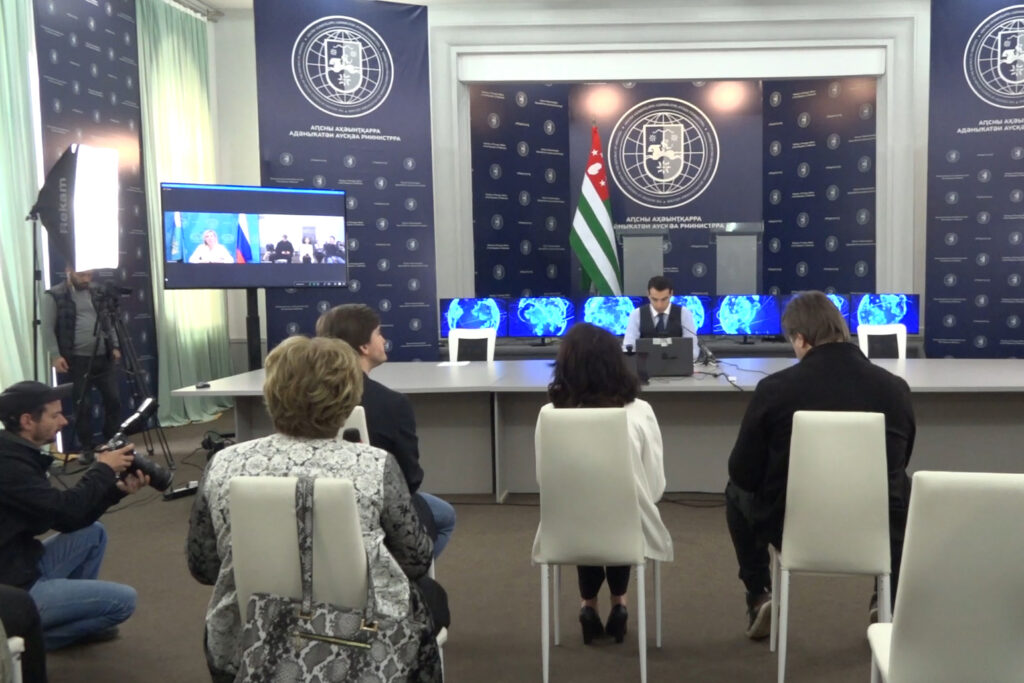Abkhazia’s Foreign Minister, Inal Ardzinba, has warned about ‘provocations’ aimed at Abkhazia from Georgia as well as those by Ukraine generally, in a joint press conference with Russian Foreign Ministry Spokesperson Maria Zakharova.
The minister began the conference in Sukhum (Sukhumi) on Friday by accusing Georgia of conducting a ‘hybrid information war’.
Ardzinba said the ministry was developing ‘special software’ to analyse publications about Abkhazia in foreign and international media.
‘This will allow us to have an objective picture of who, what, and where writes about Abkhazia’, the minister said.
‘Having full information, we will select adequate tools to respond to certain situations, primarily related to disinformation and outright provocations’, he added.
Despite the criticisms from her colleague, Zakharova praised Georgia for not joining Western sanctions on Russia, by which she said it had ‘showed itself as a truly sovereign state’.
She added that while diplomatic ties with Georgia remained severed, economic ties and people-to-people contacts were increasing.
She said that Russia and Abkhazia, meanwhile, were moving along a planned course of ‘strategic interaction’ and were unaffected by external factors.
Asked by a local journalist about how to promote a positive image of Abkhazia abroad, Zakharova said that first and foremost, Abkhazia should solve its domestic political problems and focus on ‘ending those problems that could attract attention and give rise to further aggressive information campaigns’.
‘Cancel culture’ behind postponement of talks
During the press conference, Zakharova also criticised the postponement of the Geneva discussions, which she called a continuation of Western ‘cancel culture’.
The Geneva discussions were set up to address the consequences of the August 2008 War, and are co-chaired by the EU, OSCE, and UN. The talks involve Georgian, Russian, Abkhazian, and South Ossetian negotiators, as well as the US.
On 25 April, a representative of the Russian Foreign Ministry told RIA that negotiators from the UN, EU and OSCE had postponed talks scheduled for March.
Zakharova said there was no other explanation for the suspension of the talks, as they had begun long before the crisis brought about by the Russian invasion.
She railed against what she said was a culture of tolerance brought to the point of absurdity in the West, which she said had reached the opposite goal than was intended.
Asked how relations between Russia and the West had changed since the invasion, a topic widely seen as being important in Abkhazia, Zakharova said that nothing had changed, only that processes taking place behind the scenes had become public.
She said this was visible in the ‘cancellation of Russia and everything Russian in the West’, giving the example of the Russian Sputnik V COVID-19 vaccine not being approved for use in many Western countries.
Zakharova said that what was happening in the world regarding the Russian invasion of Ukraine was ‘not turbulence’ but ‘the beginning of global tectonic shifts’.
‘And this, of course, changes everything’, she said, ‘and raises global questions that humanity does not yet have answers to’.
The primary geographic terms used in this article are those of the author’s. For ease of reading, we choose not to use qualifiers such as ‘de facto’, ‘unrecognised’, or ‘partially recognised’ when discussing institutions or political positions within Abkhazia, Nagorno-Karabakh, and South Ossetia. This does not imply a position on their status.




 29 April 2022
29 April 2022



